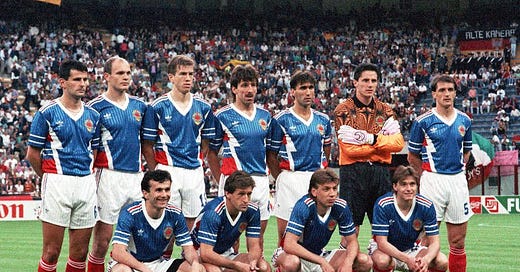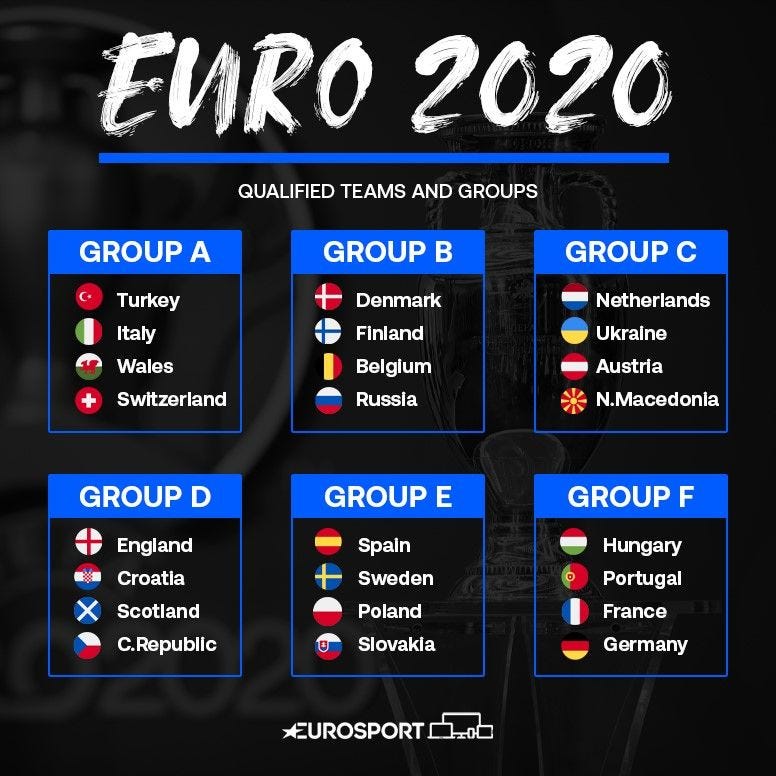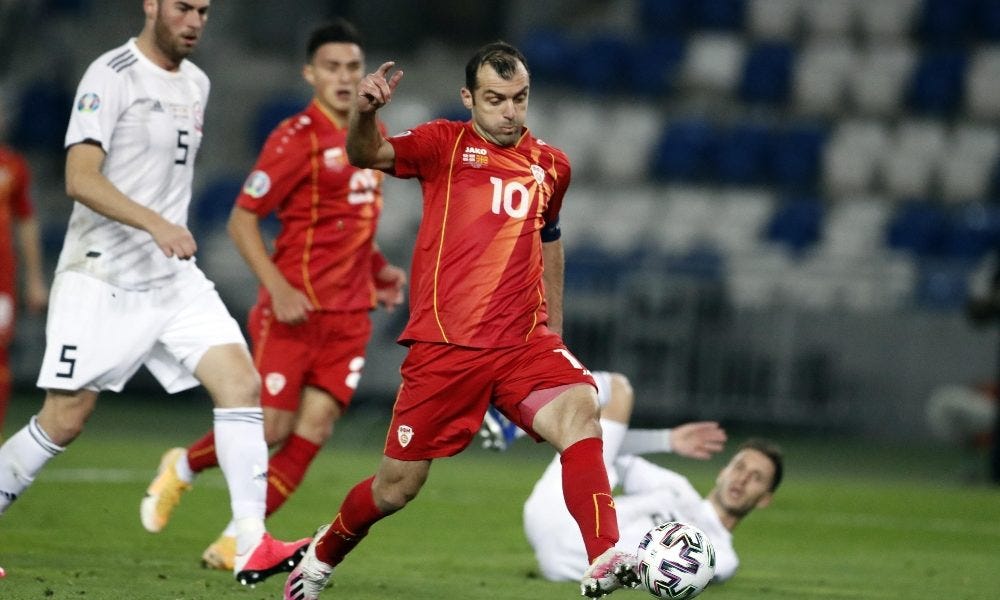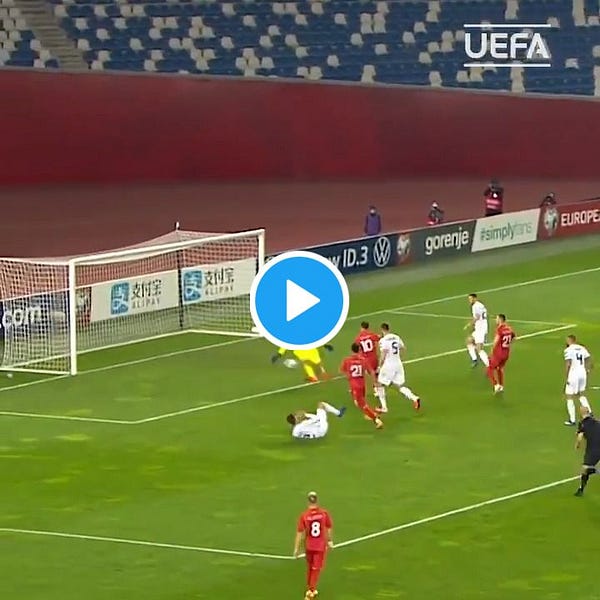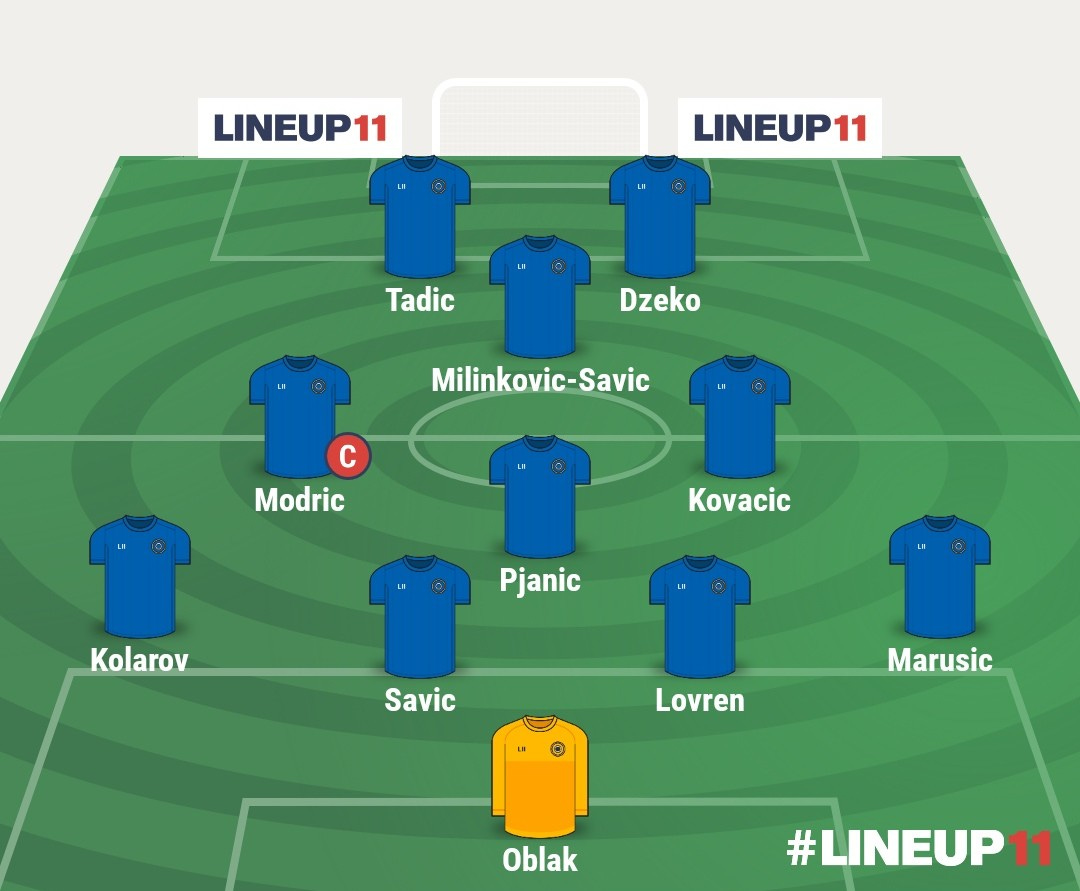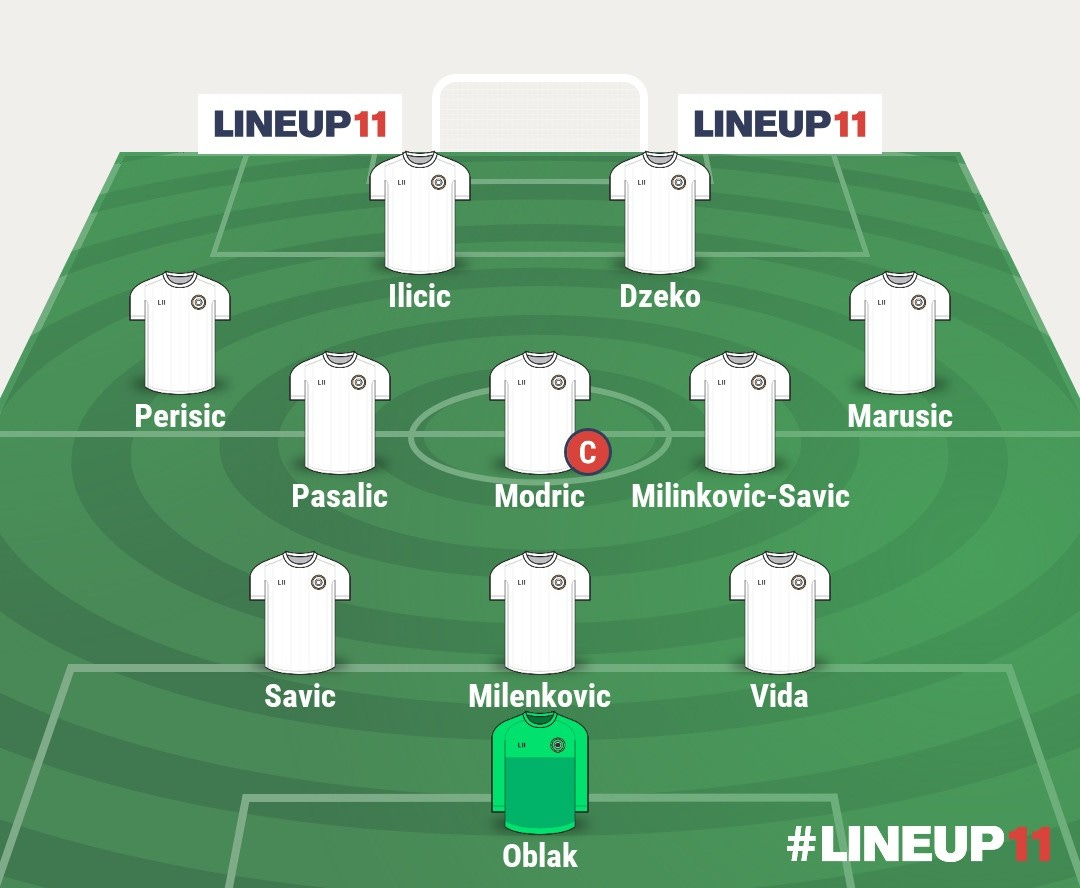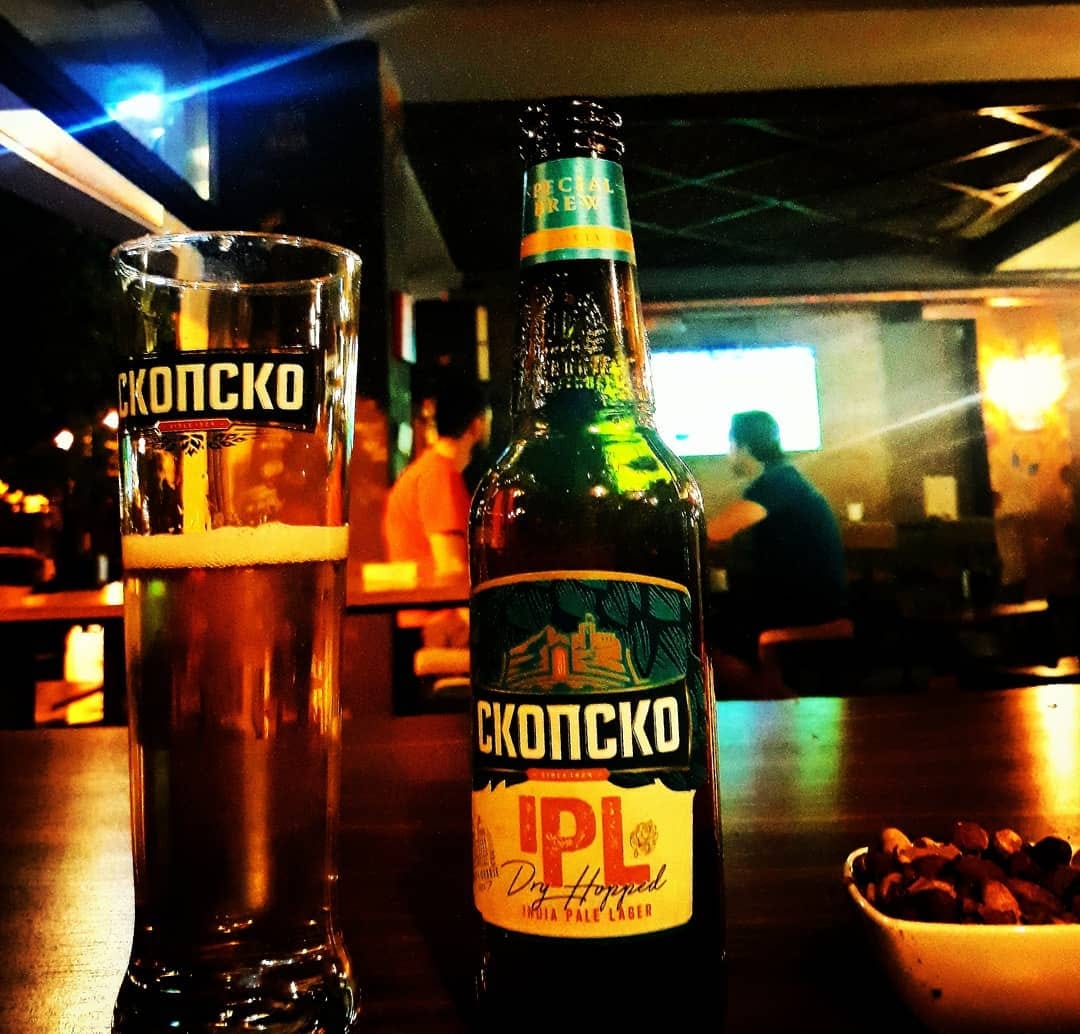XXVI. The Return of the Great Yugoslavia
Thanks to the qualification of both North Macedonia and Croatia, more than one Balkan team will take part in the European Football Championship since Euro 2000. But how would a united team play now?
Hi,
welcome back to BarBalkans, the Italian newsletter whose aim is to give a voice to the Western Balkans’ stories, on the 30th anniversary eve of the Yugoslav Wars.
We missed too many things because of the Covid-19 pandemic this year. Every football fan remembers very well what happened - or better, didn’t happen - in June/July.
Euro 2020, the first European football edition to be held in 12 cities in 12 UEFA countries, could not be played for obvious reasons.
No summer match was played and the championship was postponed to 2021.
Except for the playoffs, defining the last 4 teams to gain access to the final draw: scheduled at the end of March, they were played on November 12.
Hungary, Slovakia, Scotland. And the little North Macedonia.
For the first time in its history, this Balkan national team qualified for the final phase of this tournament, a sensational achievement.
20 years after Euro 2000 in Belgium and the Netherlands, more than one national team (that composed the former Yugoslavia) will take part in the European Football Championship, thanks to Croatia’s qualification.
A little flame of hope that the Balkan football may have again the place it deserves.
The dream that the great Yugoslavia national football team - the eternal undone - may return one day to play in the green rectangles in Europe.
The man of destiny
Goran Pandev is 37 years old. He was born in the town of Strumica. He has been playing football since he learnt to walk.
A quick and creative left-footed forward with a good technique and an excellent passing ability.
Anyone who understands a little bit of football knows him for his Italian experience. He arrived in Internazionale from North Macedonia in 2001 and he progressed through the youth academy.
He was sent on loan in other clubs (Spezia and Ancona), before joining Lazio in 2004, as part of the deal that brought the Serbian player Dejan Stanković to Milan.
He stayed 5 seasons and a half in the capital, scoring 48 goals in 159 matches. In January 2010 he joined again Internazionale. It was José Mourinho’s team, which won the Triplete four months later: Coppa Italia, Serie A and Champions League.
He remained for only two seasons. But he’s still remembered for his dedication to the team and his work ethic (as well as for the goal of the comeback against Bayern München on March 15, 2011).
He joined Napoli. One season at Galatasaray (Turkey), and then back again to Italy in 2015, signing a contract with Genoa. He found continuity there, aiming to the end of his career.
2019/20 was supposed to be his last season. Meanwhile, he tried to do the miracle: leading his North Macedonia - as a captain and flag - to the Euro 2020.
And here comes the unthinkable. The pandemic, the lockdowns, the postponement of the European tournament to 2021.
However, Pandev is not discouraged. He announces immediately that his retirement will be delayed by one year to play with North Macedonia in the playoffs against Georgia.
On November 12, the match is played in Tbilisi, at the Boris Paichadze Dinamo Arena. The Georgians have the home court advantage (whatever that means, referring to a match behind closed doors).
First period: few emotions and no score.
At the 56th minute, Elmas’s down the left sideline. A couple of feints, push-and-run with Pandev, ball to Nestorovski at the top of the penalty area.
Nestorovski passes the ball to Pandev, ready to kick it in the back of the net. It’s 0-1 for North Macedonia.
The time runs out, Georgia fails to even the game.
That’s how North Macedonia reached its first historic qualification for the European Championship, thanks to Pandev’s career goal. The man of destiny for an entire country.
“The Brazilians of Europe”
At Euro 2020, North Macedonia will join Croatia, already qualified as the first team in its group.
Two out of the seven teams that composed the united Yugoslavia football team.
Too few? Maybe. However, it’s like if the Belgium-Netherlands region was divided in seven countries. How many of their respective national teams would be competitive enough in Europe?
And the last time it happened, it was 20 years ago. Those were the times of Mihajlović and Stanković’s Yugoslavia (not the united team, of course) and Zahovič’s Slovenia. Both in Group C, Yugoslavia was eliminated in the quarter finals with a resounding defeat (6-1) against the Netherlands.
From then on, only one Balkan team for each edition. Or better, only Croatia, from Euro 2004 in Portugal to Euro 2016 in France.
The times of the great Yugoslavia - the most sparkling team in the Old Continent, “the Brazilians of Europe” - are long gone.
Almost 30 years since the Jugo-Bonito was seen on a playing field. Almost 30 years since 1990 FIFA World Cup in Italy, since the greatest ‘what if’ of the Balkan football.
Jugo-Bonito was born in Santiago de Chile in 1987, during the FIFA U-20 World Cup. Leković, Brnović, Jarni, Prosinečki, Šuker, Boban: a fresh and technical Yugoslavia team took the field.
A team that had fun while playing. It won against Brazil and East Germany and against West Germany on penalties. Blessed penalties, that time.
Three years later, one of the most complete teams ever seen took part in the 1990 FIFA World Cup in Italy. The former under-20 canter added some lightheartedness to Jozić’s muscles, Sušić’s dribbling and Stojković’s killer instinct.
The first “Magic Nights” were not the best for the ‘Brazilians of Europe’. At their debut, West Germany defeated them 4-1. However, the redemption came with two victories against Colombia and the United Arab Emirates.
Meanwhile, the young winners of the U-20 World Cup began to make their way. In the round of 16, they gave a football lesson to Spain: 2-1, two real marvelous goals scored by the striker Stojković.
The quarter-final was played at the Artemio Franchi stadium in Florence, against Diego Armando Maradona’s Argentina. The one that broke Italy’s dream of winning the World Cup at home.
Argentina-Yugoslavia promised a crackling match, possibly full of goals. Instead, it was stuck to 0-0, even at the end of extra-time. Penalty shoot-out.
The first player on the penalty spot was the symbol of that team, Dragan Stojković. But his penalty hit the crossbar: a metaphor of the entire expedition to Italy.
The same metaphor for the most beautiful Yugoslavia team we’ve ever seen: beautiful and undone.
The penalty shoot-out lottery ended 3-2 for Argentina. Ivković’s kept Maradona’s penalty, but the last two misses from Hadžibegić and Brnović were decisive: the latter was one of the young players of Jugo-Bonito. Another twist of fate.
The curtain fell on the last united Yugoslavia team in a FIFA World Cup. In 1991 the Federation began to disintegrate and the rest is history.
A national team that could have won everything, the World Cup and the European Championship, but didn’t achieve what it deserved.
One crossbar in the Artemio Franchi stadium is still vibrating.
The eternal undone team will never redeem itself.
Target: Champions of Europe
Yugoslavia, the eternal undone team, we said. We will never see it again on a playing field.
But if we tried to close our eyes and imagine a still existing united football Federation, what would we see? What would be the line-up aiming for the title of “Champions of Europe” in 2021?
A true exercise in style. But almost no journalist has ever tried to engage in it.
This is why BarBalkans welcomes Bernardo Cianfrocca and Marco Vassallo, two young promising sports journalists. You will hear for a long time about them. For merit, study and dedication.
This is how they imagined a united Yugoslavia team, once again.
Bernardo Cianfrocca’s Yugoslavia team
(if you understand Italian, you should listen to his voice)
4-3-1-2: 🇸🇮Oblak; 🇲🇪Marušić, 🇭🇷Lovren, 🇲🇪Savić, 🇷🇸Kolarov; 🇭🇷Kovačić, 🇧🇦Pjanić, 🇭🇷Modrić, 🇷🇸Milinković-Savić; 🇷🇸Tadić, 🇧🇦Dzeko
Subs: 🇸🇮Handanović; 🇽🇰Vojvoda, 🇷🇸Milenković, 🇧🇦Kolašinac; 🇭🇷Brozović, 🇽🇰Rashica, 🇭🇷Rakitić, 🇭🇷Perišić, 🇧🇦Višća; 🇸🇮Iličić, 🇲🇰Pandev, 🇷🇸Jović
Coach: 🇷🇸Milutinović/🇷🇸Stanković
- - -
Marco Vassallo’s Yugoslavia team
3-5-2: 🇸🇮Oblak; 🇭🇷Vida, 🇷🇸Milenković, 🇲🇪Savić; 🇲🇪Marušić, 🇷🇸Milinković-Savić, 🇭🇷Modrić, 🇭🇷Pašalić, 🇭🇷Perišić; 🇧🇦Dzeko, 🇸🇮Iličić
Subs: 🇸🇮Handanović; 🇷🇸Kolarov, 🇷🇸Nastasić, 🇭🇷Lovren; 🇭🇷Rakitić, 🇭🇷Brozović, 🇧🇦Pjanić, 🇷🇸Grujić, 🇭🇷Kovačić, 🇭🇷Rog; 🇷🇸Ljajić, 🇷🇸Vlahović
Coach: 🇮🇹Gian Piero Gasperini
«It would be interesting to see Gasperini as a coach in an international dimension. Thinking about him in a talented and heterogeneous national team, which needs a super partes guide. A big challenge, both for him and for Yugoslavia. “Gasp” would find two of the players that he made great: Pašalić and Iličić».
- Marco Vassallo
Pit stop. Sittin’ at the BarBalkans
We’ve arrived at the end of this piece of road entirely dedicated to football.
We need some chips and beer at our bar.
Following North Macedonia’s ride towards Euro 2020 (+1), we have to ask the innkeeper for a typical Macedonian beer. An excellent lager beer for a match in TV with friends.
So let’s have a Skopsko, the most famous and best-selling beer in the country.
Skopsko was born in the Skopje Brewery, founded in 1922. The first label was “Light Beer”, but before the Second World War it was changed with “An Export Beer from Skopje”.
By the early 1990s - with the independence of the Republic of Macedonia from Yugoslavia - the name “Skopsko” was placed in the center of the label.
It’s a classic pale-to-golden-colored pale lager, with a bitter taste that comes from the consistent presence of hops. The low fermentation and the use of dry hopping put this beer in the category of India Pale Lager.
Its slogan is: “Skopsko… and everything is possible”.
Even dreaming of the return of the great Yugoslavia, aiming for the European title.
Let’s continue the BarBalkans journey. We’ll meet again in a week, for the 27th stop.
A big hug, have a good journey… and Merry Christmas!
I thank you for getting this far with me. I hope you enjoy the trip and you’d help me to make this experience grow.
We’ve talked about North Macedonia. I recommend you to have a look at this previous newsletter that may interest you:
XXIV. Skopje, the new Amsterdam (on cannabis light and legalization)
Here you can find all the others.
You can just subscribe to BarBalkans with your e-mail address, to receive the newsletter automatically every Saturday morning.
Pay attention! The first time you will receive the newsletter, it may go to spam, or to “Promotions Tab”, if you use Gmail. Just move it to “Inbox” and, on the top of the e-mail, flag the specific option to receive the next ones there.
And then you can invite whoever you want to subscribe to the newsletter. Just use this button:
BarBalkans is on Facebook and Instagram, too! Follow it on the social media to keep you updated on the news of the day.
On the Linktree page you can find a graphically pleasing archive.

